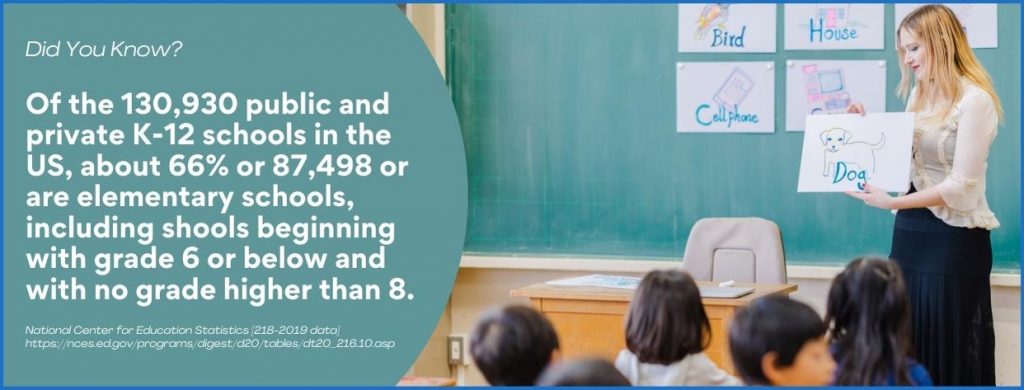Find Your Perfect School
While individuals with online associates in elementary education degrees aren’t eligible for a teaching certificate or license, they can enter the workforce immediately after graduation! Associate degree holders of every accredited elementary education program are qualified to work as private tutors, teacher assistants in elementary schools, and childcare workers.
If you want to become a full-fledged elementary school teacher or preschool teacher with a teaching license, you can transfer credits earned in an associate degree to a bachelor’s degree in elementary education.
This is true for most states, such as Florida and Texas, where a bachelor’s degree and teacher certification are necessary for public school elementary teachers.
With an online associate degree in elementary education, you will find well-paying jobs in Washington, Utah, and New Jersey, the best states for early childhood educators.
There’s also a rising demand for individuals with an online associate in elementary education degree due to the following reasons:
- Population growth resulting in increasing enrollment in elementary schools
- Teachers leaving the profession or retiring
- Increase in the number of English language learners in the country
- Shortages in teachers in specialized subject areas, particularly in special education, math, and the sciences
Quick audio summary:
Quick Summarization
Enrolling in an online associate in elementary education program prepares students for future roles as early childhood educators. Education majors can earn the associate degree in two years or less of full-time study, but it can stretch to up to three years or more with part-time study.
Graduates of online elementary education degree programs can either enter the workforce immediately in entry-level junior positions or pursue a bachelor’s degree. The online associate degree is recognized in both private and public schools, and pursuing it first offers multiple benefits.
You enjoy more flexibility because you can choose a specialization or switch majors in a bachelor’s degree if you started with an associate degree in Elementary Education. You will also be able to save time and money, thanks to the affordable tuition rate and accelerated pace at community colleges.
Use These Quick Links To Explore The Top Schools Easily:
Methodology
With an online Elementary Education degree from a regionally accredited school, you have an excellent credential to pursue a bachelor’s degree or take advantage of career opportunities! We help you decide on the best program to attend with our list of the best Online Elementary Education degrees that were chosen based on these factors:
- Delivered as a 100% online learning program or in a blended format with synchronous or asynchronous coursework,
- An Elementary Education curriculum that includes core courses in the discipline to prepare students for bachelor’s programs related to the field while also readying them to take on Psychology-related jobs,
- A Learning Management System or a virtual platform that promotes easy access to the Psychology coursework, coupled with 24/7 technical support,
- Transfer Pathway programs to make the transition to a bachelor’s program easy for Associate in Psychology degree graduates,
- Online or blended learning instructors who have had experience in the Elementary Education field and academic expertise,
- Financial aid, including federal financial assistance, scholarships, grants, and military aid for qualified students,
- Proper accreditation to demonstrate adherence to the governing rules for the delivery of online academic programs,
- Recognition from Elementary Education associations and membership in such groups that seek to promote the discipline.
Visit our Methodology page to learn about the selection process involved in putting together our list of the best Elementary Education degree programs offered online.

10 Best Online Associate in Elementary Education Degree Programs
During our school search, we came across these five online associate degrees in elementary education programs. Every elementary education program is offered by a regionally accredited school, and online students are provided with quality higher education.
Copiah-Lincoln Community College
The online Associate of Arts (AA) in Elementary Education program prepares students for careers in early childhood education, from kindergarten until sixth grade, in multiple disciplines. Students also prepare to enter the workforce immediately after earning an elementary education degree in entry-level positions.
Graduates of the associate degree program in elementary education can become transfer students in several institutions of higher learning, including:
- Mississippi University for Women (Online Partnership Pathway)
- Mississippi State University
- University of Southern Mississippi
- Delta State University
- Mississippi College
- Alcorn State University
- Mississippi Valley State University
- Jackson State University
Graduates of the associate in elementary education degree program start as junior students in the respective bachelor’s degree programs of these schools. Many of these colleges and universities also offer online programs in education and elementary education bachelor’s degrees.
Students will work with academic advisors on planning a program of study based on their preferred transfer institution.
Graduates of the associate degree program in elementary education must complete at least one of these options before being admitted into a teacher education program at these four-year institutions:
- At least a 21 composite score on the ACT;
- Passing scores in reading, writing, and math in the Praxis core test; or
- 60 hours in core courses with at least a 3.0 GPA
Graduates may also choose a specific subject area for licensure purposes, such as special education, social studies, or English.
Copiah-Lincoln Community College offers two-year online programs in diverse disciplines, with the general education and core courses eligible for transfer under articulation agreements (MATT). Co-Lin is accredited by the SACSCOC or the Southern Association of Colleges and Schools Commission on Colleges.
Brenau University
The Associate of Arts (AA) in Elementary Education program at Brenau University was formerly its online associate degree in early childhood education. Online students in the elementary education program develop the knowledge and skills necessary to become competent professionals in early childhood education.
As education majors, their knowledge covers the fundamentals of child development from birth until fifth grade. The associate degree program covers both general education classes and core courses, including:
- Human biology
- United States History
- Written and oral communication
- Reading and research writing
- Child psychology
- Introduction to teacher education
- Math concepts for teachers
- Introduction to multicultural education
Graduates who earn an associate degree in elementary education develop skills to become homeschool teachers and private tutors. Their skills also include strategies in behavior intervention using child psychology principles.
Online students can access student support resources like academic coaching, tutoring services, and writing support.
The elementary education degree has a two-year time to completion. Most online courses have a seven-week duration.
Students in the elementary education program are qualified for financial aid. Federal and state financial aid complement the TEACH Grant, a service-based financial aid.
Brenau University, a private university, has accreditation from the Southern Association of Colleges and Schools Commission on Colleges.
Front Range Community College
The education professionals behind the online Associate of Arts (AA) in Elementary Education program offered at FRCC understand that teaching combines art and science. Students learn pedagogy and practical teaching strategies that prepare them for success as early childhood educators, usually in entry-level junior positions.
FRCC provides student support services that ensure students in its associate degree in elementary education online program will graduate. Students are also provided with transfer guidance if they choose to pursue a bachelor’s degree program in elementary education after earning the associate degree.
The associate degree in elementary education program represents the first two years of a bachelor’s degree program in a four-year institution. Transfer students enter as juniors and then complete the last two years of their chosen bachelor’s degree program.
Students earn 60 credits to earn an associate degree in elementary education. The program of study has a two-year completion duration.
Education majors must complete a series of core courses, including:
- Introduction to education
- Child development
- Integrated mathematics
Students also receive well-rounded training in pursuing an elementary education degree through general education classes. English composition and world regional geography are examples.
Associate degree holders complete the freshman and sophomore years of a bachelor’s in elementary education degree.
Of the 60 credits, 41 credits can be transferred to state institutions, while the 19 credits must be unique to whatever transfer institution the student wants to transfer to for the bachelor’s degree program.
Online students can also apply for financial aid. This is because the multi-campus Front Range Community College is a regionally accredited school by the Higher Learning Commission.
Community College of Denver
The online Associate of Arts (AA) in Elementary Education program at the Community College of Denver prepares students to become the best elementary school teachers they can be! Online students learn teaching strategies in all academic subjects, including reading, writing, and math.
This is a transfer-friendly associate degree in an elementary education program. Graduates can transfer the credits they earned to a bachelor’s degree program at several four-year institutions like the University of Colorado, Colorado State University, and the University of Northern Colorado. A bachelor’s degree is a prerequisite for teacher certification or license in all states for elementary school teachers.
Transfer students save time and money by transferring the core courses in the 60-credit associate degree in an elementary education program. The core courses include :
- Introduction to Education
- Literacy Instructional Techniques
- Effective Teaching
- Teaching, Learning, and Technology
- English Language Learning (K-6)
Students in the online associate of elementary education degree program are eligible for financial aid.
Community College of Denver, a public community college, is a regionally accredited school by the Higher Learning Commission and approved to offer associate degrees in various disciplines.
Northeast Community College
The Associate of Arts (AA) in Elementary Education program at Northeast Community College is a liberal arts-centric program for aspiring early childhood professionals. The online associate degree represents the first two years of a bachelor’s degree in elementary education, too, meaning it’s a transfer-friendly option.
Online students in the associate degree in elementary education program gain hands-on experiences in elementary school settings, too. There are visits to observe and interact with professors in four-year institutions.
The associate degree in elementary education program has several professional education courses that prepare students for elementary classroom management.
Note that the associate in the elementary education program may perform a criminal background check or ask for related requirements.
Northeast Community College, a public community college system in the State of Nebraska, is accredited by the Higher Learning Commission.
If you want a respected associate degree in elementary education apart from these five schools, check out Pima Community College and its Associate of Arts in Elementary Education program.
Arkansas Northeastern College also offers two associate degree programs:
- Associate of Science in Early Childhood Education: Elementary, K-6 Option
- Associate of Applied Science in Early Childhood Education
Seminole State College of Florida
Take the first step toward your dreams of teaching elementary students through Seminole State College of Florida. The state college offers an online Elementary Education Associate in Arts pathway to help you gain the right skills to shape young minds.
The 60-credit program is open to both High School graduates and non-traditional students. The fully online option lets you take the courses in the comfort of your home or while at work. Some of the courses offered in the program are:
- Introduction to Diversity for Educators
- Introduction to the Teaching Profession
Establish a good sociological foundation in education and learn various policies related to academic teaching in Florida. You’ll also tackle issues involving diversity, culture, and gender sensitivity among educators. This will help you deal with students from all walks of life.
The class sizes in Seminole are relatively small, so you’ll get the mentorship you need. Best of all, tuition fees are lower than in other state colleges.
If you’re planning to continue to a Bachelor’s degree, you may stay at the college and enjoy a hassle-free transition. You may also opt to transfer to other accredited universities around Florida.
South Texas College
South Texas College offers an Associate of Arts in Teaching with an EC-6 Generalist track that caters to those seeking to teach in elementary schools in Texas. With this program, you’ll be able to effectively create lesson plans, examine different teaching techniques, and evaluate the different needs of a diverse class.
Aside from preparing you to teach elementary students, the associate’s degree is a good stepping stone before entering a baccalaureate program. The curriculum covers foundational courses that will help you transfer with ease.
Some of the courses offered are:
- Introduction to the Teaching Profession
- Physical Science
- Introduction to Speech Communication
- Mathematics for Teachers
- General Psychology
With these courses, you’ll be able to prepare instructional plans based on your knowledge of child development. The program will also help you consider the unique needs of students by being exposed to various cultures and social issues.
You may complete the associate’s program through the college’s distance learning option. Complete your coursework and take your exams online without visiting the campus. The 60-credit curriculum may be finished in as fast as two years, so you’ll be one step closer to starting your teaching career.
Community College of Aurora
The Community College of Aurora’s Associate of Arts in Elementary Teacher Education is perfect for those planning to pursue a Bachelor’s degree. The program’s Transfer Major is a great pathway wherein you’ll be able to take up associate courses in the community college before transferring to a university.
CCA has a transfer agreement with some of the well-known academic institutions in Colorado, including:
- University of Northern Colorado
- Western State College
- Fort Lewis College
- Metropolitan State College of Denver
- The University of Colorado at Boulder
The program comprises courses vital to establishing a good foundation in elementary education. Take up courses in English and Communication, Mathematics, and History as part of the general education requirements of the curriculum.
Additionally, through a child development course, you’ll be able to understand the cognitive and physical factors involved in developing a young mind. Public Speaking is also vital since communication plays a vital role in classroom management.
CCA Online uses the Desire2Learn platform, which enables distance learners to take up fully online classes while taking exams and submitting assignments without entering the campus. This is perfect for working professionals or part-time students who are eager to start their careers in teaching.
Northwest Nazarene University
Those interested in becoming a teacher may consider obtaining an Associate of Arts in Elementary or Secondary Education at Northwest Nazarene University. This online program is offered in both the 8-week and 5-week formats. While the program is often completed in two years by those without existing credit units, it can be earned sooner for those with existing credits.
The minimum credit requirement to successfully earn this program is 63 semester credits, 32 of which must be taken at NNU. The fully online coursework and flexible start dates allow students to pursue their associate degree anywhere in the country. It is their first step to complete a bachelor’s degree should they choose to further their education.
Here are some of the subjects covered in the curriculum:
- Introduction to Education
- Education of Exceptional Children
- Assessment and Intervention in Reading
- Fundamentals of Reading
- Educational Psychology
The classes for this program are mostly flexible. Students may transfer their AA credits into NNU’s accelerated or traditional on-campus bachelor’s programs. Using this option will allow students to earn their teaching certificate in as few as 16 months.
The Northwest Commission accredits Northwest Nazarene University on Colleges and Universities.
Rogers State University
Roger State University offers an Associate of Arts in Elementary Education for students pursuing a profession in teaching pre-kindergarten to all elementary school grade levels. This collaborative education degree program is designed to help students transition into a four-year program and allow them to complete their bachelor’s degrees faster.
As one of the first universities in Oklahoma to offer bachelor’s and associate’s degrees online, Roger State University ensures that working professionals can complete their educational pursuits without compromising their personal and professional responsibilities.
The program is known to be of high quality, ensuring that students have the needed credentials to proceed to a bachelor’s degree or start their career as elementary educators right away.
The program requires the completion of 65 credit hours to be successfully earned. Most courses provide students with the first two years of the general requirements to transfer into a four-year program. Some of the coursework includes:
- Speech Communications
- Principles of Macroeconomics
- Introduction to Psychology
- Child Psychology
- Mathematics for Critical Thinking
The university offers affordable tuition rates for the elementary education program. Plus, the online learning method makes it a convenient and flexible choice for many students.
Overview of Elementary Education as a Profession
Elementary school teachers play crucial roles in early childhood development, from teaching children their ABCs and 123s to encouraging their socio-emotional development.
Roles and Responsibilities
With their education degree from an accredited bachelor’s in elementary education program, they have professional abilities to perform these duties:
- Create lesson plans for diverse subjects like reading, math, and science
- Provide instruction in various subject areas
- Grade the student’s academic performance and conduct
- Provide supplemental instruction, such as in special education, when necessary
- Assist in the development of their social and emotional skills
- Work with other early childhood educators and stakeholders to improve student performance
- Communicate with the student’s parents, guardians, and/or adults about their progress
- Prepare students for the state’s standardized tests
- Manage activities in and out of the classroom
Students in online associate in elementary education programs also gain the knowledge and skills to perform these duties. But they can only act as teaching assistants to full-fledged elementary school teachers.
The typical elementary school grades are from first to sixth grades. However, there are some elementary schools where teachers handle classes up to the eighth grade.
Many elementary school teachers handle several subject areas during an entire school day. However, many licensed teachers in elementary education also specialize in a specific subject area, such as math, art, or special education. The choice in specialization is typically made in a bachelor’s degree program.
Education, Certifications, and Licenses
Elementary school teachers in public schools must possess either a teacher certification or a teacher license, usually in a specific grade level. Elementary teachers in private schools may or may not have a teaching certification or license, but it’s best to possess one.
While each state has different requirements for teacher certification or license, the general requirements include the following:
- A bachelor’s degree in education from a regionally accredited school
- A student teaching practicum experience
- Passing a criminal background check
- Passing other teacher certification requirements, such as a written examination and a practical demonstration
Elementary school teachers may also be required to complete professional development or continuing education classes to maintain their teacher certification. Many states may also require a master’s degree from elementary school teachers for this purpose.
What if you don’t have a bachelor’s degree in elementary education or you don’t have education courses on your transcript? You can complete a teacher education program where courses in child development and instructional strategies are taught. You can then apply for teacher certification after fulfilling specific requirements.
Skills and Qualities
Pursuing an online associate in elementary education degree will develop the skills and qualities that elementary school teachers must possess.
Elementary school teachers become more effective when their teaching strategies are combined with soft skills like:
- Communication skills, both in communicating concepts and instructions to students and in working with parents, administrators, and stakeholders;
- Patience since some students will require extra attention in their academics and/or in their social skills;
- Resourcefulness enables them to overcome the challenges of the teaching profession
Elementary school teachers should also be physically and mentally fit because of the oftentimes challenging demands of the profession.
In terms of career advancement, you can become a lead teacher with more work experience and continuing education. You can pursue a career as a school counselor, principal, or instructional coordinator.
And all these great things in your pursuit of a teaching career can start with an online associate degree in elementary education!
Overview of Online Associate in Elementary Education Programs
While community colleges are the more popular schools for an online associate degree in elementary education, many four-year institutions also offer it. Both institutions of higher learning share similarities in their associate degree programs, from their admissions process to their graduation requirements.
Admissions Process
Every online program has its admissions process and corresponding requirements; thus, applicants must carefully read and understand these aspects. However, the majority of associates in elementary education programs have the following admission requirements:
- Completion of an application form online,
- Proof of high school diploma or the GED equivalent with minimum cumulative GPA,
- College-level credits for transfer, if any, such as from an associate degree or Advanced Placement courses
Letters of recommendation, personal essays, and current resumes are uncommon requirements for online associate degrees in elementary education programs. Applicants to bachelor’s degree programs, however, must be ready with these documents.
Program Duration
Online students in a typical associate degree in elementary education program have two years to complete their academic requirements, including their practicum period. Many online programs offer a part-time enrollment option, meaning a three-year time-to-completion.
Look for an accelerated option if you want to earn an associate degree in less than two years. Note that the program of study will be fast-paced and challenging.
Credits, Curriculum, and Course Descriptions
Online students tackle a challenging elementary education curriculum with general education courses and core courses. The curriculum of online associate degrees mirrors the first two years of a bachelor’s degree program in elementary education. This means a minimum of 60 semester credits for completion.
But the associate degree in elementary education can stand on its own, so to speak! The core courses prepare students for the real-world challenges of working in elementary schools and other early childhood facilities.
Introduction to Education
The course focuses on the diverse forces shaping the public education landscape in the United States and its current issues, including K-12 diversity. Students also learn about family and community relationships and early childhood education principles.
Effective Teaching Methods
Students learn about the best strategies for teaching at the elementary school level, including lesson planning, test design, and learning styles.
Teaching and Technology
The course prepares students for technology integration into their elementary grade curriculum. Students explore diverse teaching-related technologies, such as the Internet, audiovisual aids, and multimedia graphics.
Literacy Instructional Techniques
Students learn about education theory and its practical applications in the classroom.
Child Development
The course introduces the stages of child development and their impact on teaching children. Students may also learn about educational psychology and child psychology.
Components of Online Learning
Online students in associate degree programs are just as challenged by their coursework as their on-campus counterparts. They have the advantage of 24/7 access to most of their learning materials, thanks to asynchronous formats.
Learning Technologies
Online education is done over the web, meaning online associate degree programs use multiple learning technologies. The typical online program, for example, uses a combination of a learning management system, productivity tools, and collaboration tools.
The most commonly used learning management systems or LMS in the higher education sector are:
- Blackboard, available in both SaaS and non-SaaS models
- Moodle, a free, community-driven, and open-source platform
- Canvas, a user-friendly platform with native web hosting features
Some online programs may also feature digital simulations where students learn practical skills in virtual settings mimicking real-world scenarios.
Assessments and Evaluations
Online students are also evaluated based on their academic performance throughout the online associate degree in an elementary education program. Every online program has its unique grading system and methods of evaluation, but the common ones include the following:
- Lessons via recorded and live lectures
- Reading materials
- Quizzes and exams
- Assignments with weekly deadlines
- Reflective journals
- Portfolio of lesson plans
Internship and Practicum Requirements
Online students pursuing an associate degree in elementary education may also be required to complete student teaching requirements. This is typically achieved through a practicum in elementary schools where they observe early childhood educators in action and even provide teaching-related assistance.
The student teaching experience is an opportunity for hands-on experience to complete the classroom coursework. Check if the online education program also has a capstone course.
Tuition and Financial Aid
Online students pursuing an online associate degree in elementary education in community colleges agree that their tuition fees are more affordable. The tuition is even more affordable with financial aid, such as federal financial aid and institutional scholarships.
Careers and Salaries of Graduates of Associate in Elementary Education Programs
Online associate’s degrees in elementary education can lead to the following occupations. But if you want to enjoy career advancement, such as being a full-fledged elementary teacher, you should earn a bachelor’s degree in elementary education.
Dollar figures are the average annual salary for each occupation.
Teacher Assistant ($29,360/year)
Being an assistant to elementary teachers is a great way to start your teaching career since you will gain hands-on experience in an elementary school setting. You will work in public and private schools, after-school programs, and preschools.
Preschool Teacher ($38,609/year)
You can be employed as a preschool teacher with an associate degree in elementary education or work under the supervision of pre-elementary teachers. As a preschool teacher, you will assist children through classroom instruction and play in developing their 3Rs and social skills.
Childcare Worker ($38,331/year)
If you don’t have classroom experience yet, you may want to consider being a childcare worker with your associate degree in elementary education. As a childcare worker, you will look after the basic needs of children in childcare facilities, such as daycare centers and after-school facilities.
Private Tutor ($33,236/year)
Children in elementary school who may have difficulty in specific subject areas or in general may seek private tutors. Since being a private tutor can be a part-time job, you may still have time to pursue a bachelor’s degree in elementary education.
Frequently Asked Questions
Is an Associate in Elementary Education worth the time, effort, and money?
Yes, it is! You can find immediate employment in early childhood-related occupations, thus, allowing you to recoup your investments in time and money.
Are there challenges to pursuing an online Associate in Elementary Education?
Yes, and these will challenge your perseverance and patience. The challenges of reading the learning materials, submitting assignments on time, and studying for exams are common among online students.
What are the steps in choosing an online Associate in Elementary Education program?
First, determine your career goals, starting with whether you want a teaching license or not. Then, do a school search based on accreditation, quality of instruction, cost, and student support services.
What are the concentrations in Elementary Education programs?
At the associate degree level, it’s uncommon for an education program to offer concentrations. However, bachelor’s degree programs allow students to choose specializations. Examples include special education, mathematics, and English.
What are the educational paths for associate degree holders of Elementary Education?
A bachelor’s degree in elementary education is a popular choice. But you may also consider a bachelor’s degree in special education or other types of education degrees.
How long does completing an online associate’s in Elementary Education take?
Depending on the number of prescribed credit hours, you may finish an online associate’s degree in as short as 24 months. Elementary education programs usually require 60 credit hours, which may vary depending on the college requirements.
It’s best to check for different options to complete your degree quickly. Some schools offer accelerated tracks and transfer credits to help you graduate earlier.
What happens when students continue to a 4-year degree program?
Each college has its own guidelines and requirements when continuing into a Bachelor’s degree. There’s usually a list of accredited courses that may be transferred, so you won’t have to retake them. Before completing the degree, meeting with a school advisor to discuss your transfer and be guided with the necessary requirements is important.
Most institutions have transfer agreements through which transfers can be made easily.
Points to Ponder
- An online Associate in Elementary Education can be a standalone degree that opens doors to employment as a private tutor, teacher assistant, or childcare worker. But a bachelor’s degree will make your opportunities for career advancement even better.
- Take advantage of opportunities for hands-on learning in elementary education settings when pursuing an associate degree. Not only will it strengthen your practical skills, but it will also lay the foundation for professional success.
Additional Resources:


















